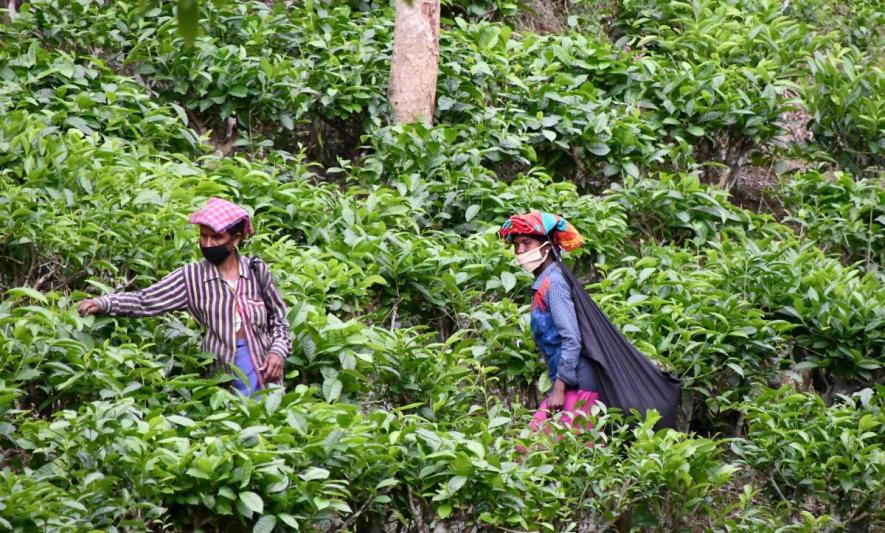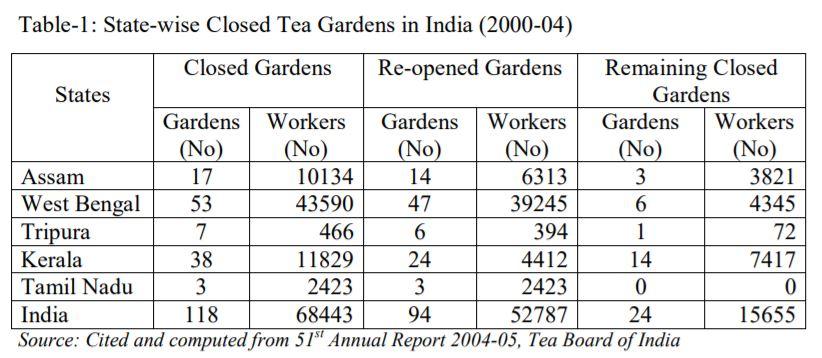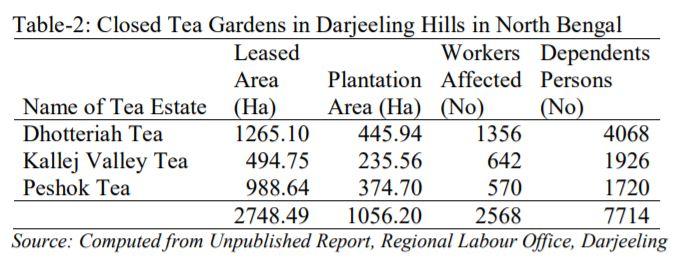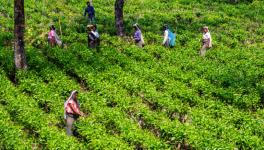COVID-19 and Closed Tea Gardens: Issues of Livelihoods in India

The issue of closed tea gardens is an old phenomenon in Tea Economy. We have examples of Tea Estates after closing down converted to Workers’ Co-operative and have been running successfully in various parts. The Durgabari Co-operative in Tripura is successful story of such kind. The Durgabari Tea Estate was a private tea garden and has a grant of 145 acres of tea plantation. The garden was passing through deep crisis and abandoned by the owners in 1970s. Then the Government of Tripura cancelled the grant of the abandoned garden and formed Durgabari Tea Estate Workers Cooperative Society Ltd. in 1978. There are two units are under operation with plantation area of 310 acres and 643 workers. It produces roughly six lakh kg of made tea every year (Brochure: 31.03.2014).. Similarly, the Sanjukta Vikash Co-operative (SVC) was formed in 1996 with support of DLR Prerna in Darjeeling hills. The SVC is spread over Harsing, Dabaiani and Yankhoo villages with 448 members. These villages are part of closed tea estate of Harrison’s and Mineral Spring in Darjeeling. The garden had around 1200 acres with 600 acres of tea plantation and rest under reserve forests (DLR Prerna: 17.06.2005). The SVC has tied up with Tea Promoters of India (TPI) which a corporate body facilitated by DLR Prerna (NGO). Today SVC tea is marketed internationally and it has been certified under ECC 2092/91(EU Standards), Naturland (German), Bio-Suisse (Swiss) and National Organic Program (USA). SVC is also certified under National Program for Organic Production (India).
The success stories mentioned above indicates that the current scenario of closed tea garden in India has to introspect with caution, deeper insights and utter negligence of state and its agencies. It is to be reported that the Tea Economy was in passing through a crisis during 2000-04 and 118 tea gardens were closed in five major tea growing states in India i.e. Assam, West Bengal, Tripura, kerala and Tamil Nadu (Table-1). It affected livelihoods of 68,443 workers collectively. The Government of India, Tea Board and State Governments took several initiatives including Expert Committee to look after the issues and consequently 94 gardens were re-opened and 52787 workers job were restored. 24 gardens remain closed which affected 15655 workers. If you have closer look into closed tea garden, one finds highest number gardens were situated in West Bengal i.e. 53 out of 118. Similarly workers affected is 43590 out of 68443 in India which around 64 percent of total workers.

There are three Tea Gardens namely Dhotteriah (Sonada), Kallej Valley (Ghom) and Peshok (Rongli-Rongliot) in Darjeeling Hills have been announced lockout by the Government of West Bengal (Sikkim Express: September 06, 2019). All the gardens are run by Trident Agrocom Exports Pvt. Ltd. Mumbai. As per the Darjeeling Terai Dooars Plantation Labour Union (DTDPLU) and Labour Office, Darjeeling they had 1356, 642 and 570 employed workers respectively (Table-2). Altogether 1056.2 hectares of tea plantation is lying abandoned affecting 2568 labourers livelihoods and 7714 dependents of their families. These gardens are closed since last five years and the State Government officially announced lockdown on September 05, 2019. It has been announced that each worker will get compensation of Rs.1500/-per month for the period from May 2018 to October 2019. To realise the benefits, workers need to give their Voter ID, Aadhaar No, PF Account number and bank account number to Labour Office. The retired workers and other workers who migrated to work outside and taken their PF amount will not be getting financial help announced by the Government.Source: Cited and computed from 51st Annual Report 2004-05, Tea Board of India

A Closed Tea garden situated in Chopra block of Uttar Dinajpur district under tea growing areas of North Bengal (Field Survey, 2020). As per the local informants, it has been closed since 2012-13 and owned by Duncans Private Limited Company. The garden has approximately 250 hectares of tea planted area and spread over four mouzas of Lakhipur, Mohangach, Goabari and Goalgach under Block Land and Land Reforms Office, Chopra under Islampur sub-division. The tea factory is situated at Goalgach (Field Survey, 2020). It is to be mentioned that the Duncans were the first tea garden in district Uttar Dinajpur received No-objection Certificate (NOC) from the Government of West Bengal during 1990s alongwith some Small Tea Growers (STGs). As per local informants, there were 400 workers including permanent and temporary were employed in the tea garden that have been displaced from their work since then. A rough estimation of 2000 persons was dependent directly of the workers households in this garden. Some of the labourers said that local leaders on ruling governance are responsible for such a situation. The garden has not been officially lockout so far and no alternative plan has been announced by the Government and local administration is silent on the matter. In fact, these are areas from where outmigration of labourers to different cities of India is an ongoing phenomenon to search alternatives livelihoods. In an interview to Mr. Arun Jha, special correspondent of Uttarbanga Sambad (Islampur), Dr.Narayan Midya, Medical Officer, Islampur Sub-Divisional Hospital Uttar Dinajpur expressed that there are 12272 persons of migrant labourers (as on 17.04.2020) were returned home from various states of India and were sent for home quarantine (Uttarbanga Sambad: 18.04.2020). Source: Computed from Unpublished Report, Regional Labour Office, Darjeeling
Since COVID-19 pandemic has affected throughout and there is a reverse trends of unorganised workforce returning to their native villages, the issue of Closed Tea Gardens anywhere is a cause of worry and attention to the local governance. As witnessed, many a times from the tea economy, the surplus labour used to out-migrate in cities to search alternatives. The current situation is reverse and local government must work pro-actively to restore the livelihoods particularly in closed tea gardens. The district authorities should work hand in hand with Tea Board of India and State Governments to restore the livelihoods of closed tea gardens throughout India and West Bengal in particular. In a judgement of WP (C) No. 365 of 2006, the Hon’ble Supreme Court on March 04, 2018 has directed the State Governments of Assam, West Bengal, Tamil Nadu and Kerala to make an interim payment of Rs.127 crores to tea garden workers who had not been paid for 15 years in Closed Tea Gardens of their respective states. The central government has submitted that the dues of workman was 249 crores in Assam, 27 crores in Kerala, 70 crores in Tamil Nadu, and 30 crores in West Bengal. The Hon’ble SC has directed further in its order dated 04.04.2018 the state governments to comply within 60 days by way of interim relief to the suffering workers and their families (https://hrln.org/: 04.04.2018). Since Tea Board of India is the regulatory body as per the Tea Act, 1953 and Plantation Labour Act, 1951, it should monitor its implementation and preparation of its database and its adherence in all four states and disseminate the garden-wise list of beneficiaries under the DBT system. The Tea Board of India should also publish noumber of beneficiaries in each state in coordination with all notified states i.e. Assam, West Bengal, Tamil Nadu and Kerala as reported in 51st Annual Report of the Board mentioned in Table-1 above. Similarly, the State Governments and the local administration where a particular Closed Tea Garden is situated are to be made answerable through District Collector or Magistrate for adherence of the order of the Hon’ble Supreme Court and their initiatives undertaken so far.
The author is working as Assistant Professor, Department of Geography, Sikkim Central University, Gangtok and thankful to Ms. Dixchen Golay, Research Scholar of Department of Geography for the providing data support of three closed tea gardens situated in Darjeeling Hills. The comments and views may be sent to the author at [email protected] / [email protected]
Get the latest reports & analysis with people's perspective on Protests, movements & deep analytical videos, discussions of the current affairs in your Telegram app. Subscribe to NewsClick's Telegram channel & get Real-Time updates on stories, as they get published on our website.























